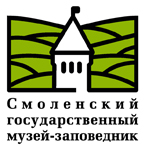|
The Smolensk State Museum-Preserve

Phone: (4812) 38-73-73, 38-38-62
Address: 214000, Smolensk region, Smolensk City, Communisticheskaya Road, 4
Location: from the Railway Station to Tukhachevskiy Street by bus or by fixed-route taxi№ 10, № 21,№ 22,№ 40, № 41,by tram № 7; from Collhoznaya Square to Glinka Street by bus or by fixed-route taxi № 21, № 42
Working hours:*
Internet:
www.russianmuseums.info/M673 - official web page
The Smolensk State Museum-Preserve - W1508, official web site www.smolensk-museum.ru/
E-Mail: ,
| billboard, events and excursions |  |
Description:
The Smolensk State Museum-Preserve was found in 1888, and now it's one of the largest many profiled museum units in Russia. It consists of 12 Smolensk exposition departments in Smolensk and 4 regional branch officers. The museum funds run above 600 thousands exhibits including more than 400 thousands things of the main fund. The most unique things are those collected by the founders of the museum, such as: M.K. Tenisheva, S.P. Pisarev, V.I. Grachyov, I.F. Barshevskiy, G.L. Gravve, and Y.Y. Alekseyev. The most special pages of the many centuries of the Russian history connected with the Smolensk Region are reflected in its expositions. It's the ancient history - the first mention of Smolensk in chronicles as "city great and large in people" refers to the year of 863. It's the heroism and the military valor of thelong suffering defender of the Western borders of Russia. It's the ancient traditions and the skill of flax growing. It's the motherland of the composerand the ancestor of the Russian classical music M. I. Glinka, of the outstanding sculpture S.T. Konyonkov, of the traveler and explorer M.N. Przhevalskiy, of the poet A.T. Tvardovskiy. It's Talashkino - the famous art center of Russia at the edge of the 19th - 20th centuries connected with the studying and the revival of the traditions of the Russian applied arts. The Smolensk City museums are the next: the museum "the Smolensk Flax", the Museum of Sculpture of S.T. Konyonkov, the History Museum,the museum "the Smolensk Region in the years of the Great Patriotic War, 1941 - 1945", the museum " In the World of a Fairy Tale", the museum "the City Smithy", the museum of Nature and Ecology, the flat museum "A.T. Tvardovskiy in Smolensk, 1943 - 1965", the Historical and Architectural Complex "Teremok". The branches of the Museum situated in the Smolensk Region: the Estate Museum M.I. Glinka, the House Museum N.M. Przhevalskiy, the museum of the Partisans' Glory, the House and Estate of A.T. Tvardovskiy, the House Museum of M.A. Yegorov. In 2013 the Smolensk State Museum-Preserve will celebrateits 125th anniversary. But in spite of such a solid age it confirms itself in a new quality, searches for the new approaches to the matter, takes an active part in interregional and international projects
|
Museum's building(s):
The Museum-Preserve occupies 36 buildings, and 32 of them are the monuments of architecture. Among them there are such unique and aesthetically satisfying buildings as a couple of the Historical and Architectural Complex "Teremok" in Flyonovo (not far from Talashkino): the Church of the Holy Spirit (1902 - 1903) decorated with the mosaic by N. K. Roerich's design, and so-called "Teremok", looking like a house from a fairy tale small chamber-tower built by the project of C. V. Malutin in the style of the Russian Revival Architecture. One of the war history museums occupies the polyhedral Gromovaya (Thunder) Tower of the Smolensk Fortress Wall (1596 - 1602). Some buildings have attractiveness in the aspects of art and history. Among them there is a building of the museum "the Russian Antique" (1903 - 1905) built for M. K. Tenisheva's art collection, the former building of Tsar Alexander the II Technical High School (1878) occupied by the new exposition of the Picture Gallery, a one-stored building with a mezzanine floor of the late 19th century given to the Museum of Sculpture ofS. T. Konyonkov in 1973
|
|
Museum foundator: Pisarev Semyon Petrovich (1846-1904), Tenisheva Maria Klavdiyevna (1858-1928)
|
Museum's services:
museum shop, lecture hall, Internet access, theatre
Museum has :
theartre
Next to the museum there are:
hotels and restaurants
| for museum professionals |  |
Administrative phone:
(4812) 38-73-73, Fax: (4812) 38-73-46
Foundation and opening day:
founded: 28.06.1888
Organisation status:
State Russia
Organization form:
non-for-profit
Organisation type:
culture for society, scientific, educational
Classification:
Museum preserve
Squares:
permament show rooms 5009,9м2
temporary exhibitions 178,1м2
museum's store 1663,8м2
museum's parks 38,2га
Employee number:
264 (curators: 86)
Average visitors per year:
246570
Specific departments:
archive, science library, experts team, restoration dep. (живопись, графика, керамика, ткани, темперная живопись, дерево)
Collections volume:
608 000, rare collection's items: свыше 400 000
Rare collections (unique items):
The memorial things of M. I. Glinka's family - 60 things
The sculptural works of S. T. Konyonkov - 80 things
The collection of the decorative and applied art works ofM. K. Tenisheva- 3 000 things
The archaeological collection of the things from the excavations of the Gnyozdovo Archaeological Complex - approx. 2 000 things
The memorial things of N. M. Przhevalskiy (the science library, his own things) - 1 500 things
The Western Europe paintings - 400 things
The books of the printing pioneer Ivan Fyodorov - 3 things
The charters and scrolls of the 17th - 18th centuries - 150 things
The collection of guilds' banners of the Smolensk City of the 19th century - 9 things
The Russian women's head-dresses - 200 things
The Slutsk belts (with fragments) - 40 things
The collection of M. Pogodin's photos on ethnography of the Smolensk Province - 400 things
most interesting collection items
|
|
Web sites and CD-disks:
above 
Notes:
The official name of the organization: the Regional State Budgetary Institution of Culture "The Smolensk State Museum-Preserve".
Copyright (c) 1996-2024 The Smolensk State Museum-Preserve
Copyright (c) 1996-2025 Russian Museums .info
|

